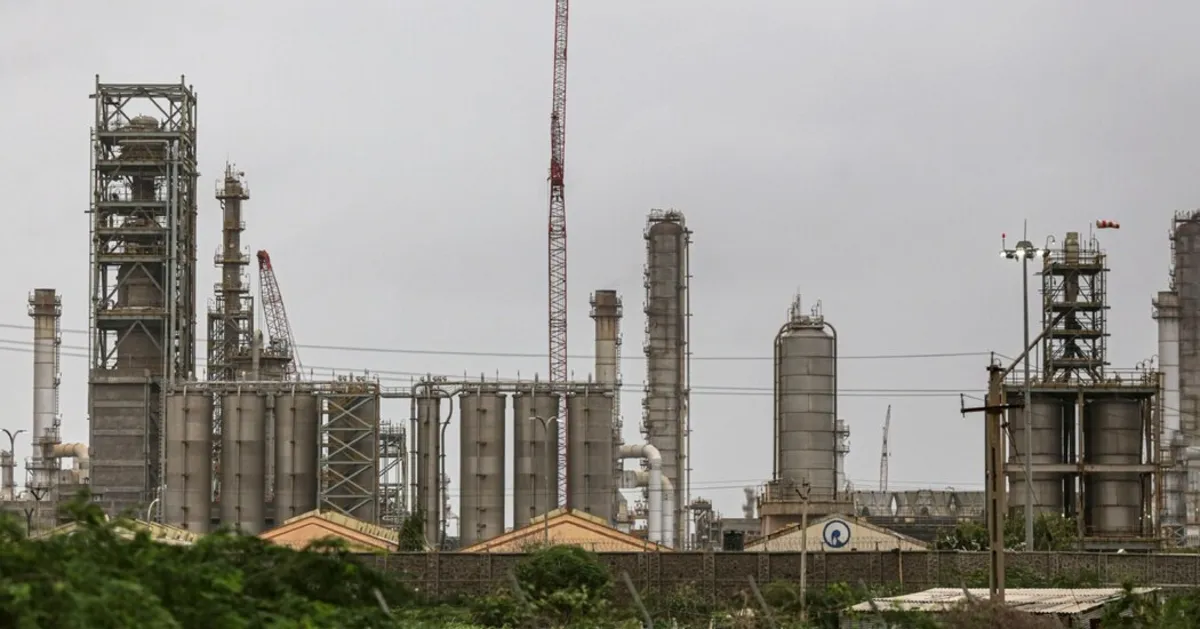
Many Americans last turned their attention to Jamnagar, a sun-drenched industrial region located on the mud flats of India’s Gulf of Kutch, during a celebrity event featuring Rihanna in March 2024. The singer performed for an exclusive gathering that included notable figures such as Bill Gates, Mark Zuckerberg, and Ivanka Trump, at the pre-wedding festivities of Anant Ambani, the youngest son of Mukesh Ambani, Asia's wealthiest individual. The choice of Jamnagar as the venue was significant, as the area hosts vital oil refineries and ports integral to the Ambani family’s empire, which boasts an estimated fortune of $115 billion.
However, the narrative surrounding Jamnagar shifted dramatically this week, as it became a focal point in a more contentious story. The oil trade in Jamnagar, including significant imports from Russia, is now a contentious issue affecting U.S.-Indian relations. Following months of negotiations and trade discussions, tensions escalated last week when President Trump imposed a 25 percent tariff on India. He controversially suggested via social media that American companies might soon engage in oil exploration with India’s rival, Pakistan, insinuating that they might supply oil to India in the future.
Just a week later, President Trump escalated the situation by signing an executive order that doubled the tariffs. This action placed Indian exporters in a precarious position, alleging that the Indian government was enabling Russia's war efforts in Ukraine by allowing its companies to profit from the global oil trade. Although President Trump did not specify which companies were involved, industry analysts and insiders recognize that the spotlight inevitably falls on Mukesh Ambani and his conglomerate, Reliance Industries.
Reliance Industries operates the world's largest refinery in Jamnagar, located in Gujarat, the home state of Prime Minister Narendra Modi. This facility is not only crucial in terms of production — processing around 1.5 million barrels of oil per day, with approximately one-third sourced from Russia — but also in its strategic importance. It has been developed in collaboration with political figures, including Modi himself. The refinery's versatility allows it to refine various types of crude oil, having processed over 500 different kinds in the past 25 years, according to a company spokesperson.
Despite the prevalent narrative that Reliance's profits are primarily attributable to discounted Russian crude oil, the spokesperson contended that this view is misleading. He emphasized that the company has consistently been profitable over the decades, often outpacing regional competitors, both before and after the onset of war-related discounts.
In proximity to Reliance’s operations is Nayara Energy, another significant refining entity in Jamnagar. Although Nayara's output is only about a third of Reliance’s, it is also a modern facility. Since 2017, it has been 49 percent owned by Rosneft, the Russian state oil company, creating a complex relationship between Russian energy and Indian refining. Nayara’s ownership structure indicates that it is heavily reliant on Russian oil, processing it in India and occasionally re-exporting refined products back to Europe.
During the first year of the conflict in Ukraine, Indian private refiners, including Nayara, became the largest purchasers of Russian crude oil. With European markets effectively closed to Russian oil, Russia began offering discounts to any country willing to accept its stranded crude. India, along with China and Turkey, capitalized on this opportunity.
Initially, the response to these developments was somewhat muted; U.S. officials, including Eric Garcetti, the U.S. ambassador to India, acknowledged in May 2024 that they welcomed purchases of Russian oil to help stabilize global prices. However, President Trump's declaration sparked unexpected outrage. Pankaj Saran, a former Indian ambassador to Russia and head of the NatStrat think tank, remarked that the penalties seemed to stem from actions visible since 2022, suggesting that Trump’s focus on Russian oil could be a distraction from the underlying issues.
As Saran pointed out, India is vulnerable to rising energy costs due to its limited domestic oil production, leading the government to actively support its refining sector. While Reliance's robust financial standing might enable it to weather the storm, Nayara Energy's future remains uncertain, as it did not respond to requests for comment. There are indications that Indian importers are already reducing their crude purchases in anticipation of stricter European sanctions.
Trump's threats have placed Prime Minister Modi's government in a difficult position, as any shift away from Russian oil could be perceived as a capitulation. Navigating this complex geopolitical landscape presents a significant challenge for India, especially as the nation seeks to balance economic interests with international diplomacy.